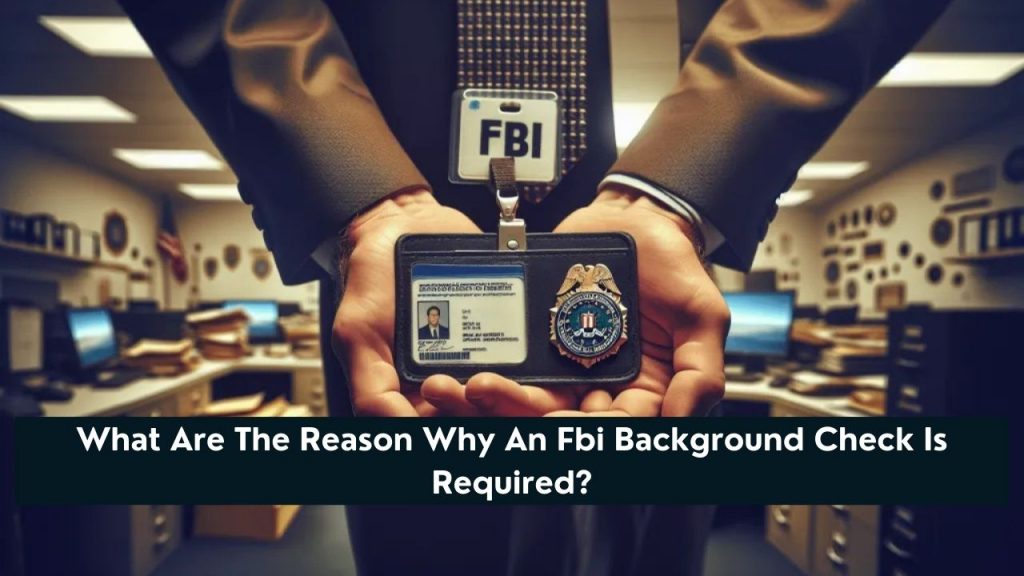An FBI background check is a comprehensive review of an individual’s criminal history, conducted through the FBI’s extensive national database. This type of background screening involves searching various records, including arrests, convictions, warrants, and more. The information retrieved during an FBI check can be crucial for employers, government agencies, and individuals to verify someone’s background and ensure safety or compliance with legal requirements.
The FBI background check process typically involves fingerprinting, though some checks may be name-based. It’s part of the agency’s broader responsibility to support law enforcement and ensure national security. Understanding why an FBI background check is required in different contexts helps clarify its importance in society.
Reasons for FBI Background Checks
There are multiple reasons why an FBI background check may be required, each serving a specific purpose related to security, public safety, and legal compliance.
Employment Screening
Many employers, especially those in sensitive industries such as healthcare, education, and finance, mandate FBI background checks before hiring. For example, jobs involving access to vulnerable populations like children or the elderly require thorough vetting to prevent hiring individuals with criminal histories that could pose a risk to public safety.
Immigration and Visa Requirements
People applying for immigration benefits or certain types of visas in the U.S. often undergo an FBI background check as part of the process. This ensures that applicants don’t have a criminal history that would make them ineligible for immigration benefits or pose a security risk.
Licensing and Certification Requirements
Professionals seeking to enter fields like law, medicine, and aviation must often pass an FBI background check to obtain a license. This is especially true for jobs that deal with sensitive data or national infrastructure, where trustworthiness is essential.
Adoption and Foster Care Screening
Individuals wishing to adopt children or become foster parents are usually subject to FBI background checks. This is to ensure the safety of children and prevent them from being placed in environments where there could be a risk of harm.
Military Enlistment
Joining the U.S. military typically involves an FBI background check. The military needs to ensure that recruits don’t have any disqualifying criminal records that could compromise national security or undermine the integrity of the armed forces.
Security Clearances for Government Positions
FBI background checks are critical for individuals seeking security clearances for federal government positions. These clearances are necessary for jobs that involve access to classified information or areas important to national security. Without a clean record, candidates may be denied such clearances.
Firearms Purchases
In the U.S., individuals purchasing firearms from licensed dealers must undergo a background check, including an FBI check. This requirement is part of the Brady Handgun Violence Prevention Act and helps ensure that firearms are not sold to individuals who are prohibited from owning them, such as felons or those with a history of domestic violence.
International Travel and Extradition
In some cases, FBI background checks are required for individuals traveling internationally or facing extradition to another country. This ensures that someone with a serious criminal background does not evade justice or commit crimes in another jurisdiction.
Expanding the Scope: Associated Services and Necessities
In conjunction with the necessity for an FBI background check, there are several related services that play critical roles in specific circumstances. These include FBI apostille services, FBI background check apostille, FBI apostille translation, and ink fingerprinting. These services are essential for individuals who need to validate the legality of their background check internationally, particularly for countries that are members of the Hague Apostille Convention.
Legal Basis for FBI Background Checks
The legal foundation for FBI background checks is rooted in various U.S. laws and regulations. For instance, the Brady Act mandates background checks for firearms sales, while the Immigration and Nationality Act (INA) includes provisions requiring checks for immigration applicants.
3.1 Relevant U.S. Laws and Regulations FBI background checks are guided by federal laws such as the Fair Credit Reporting Act (FCRA), which governs the accuracy and use of background check information. Other regulations, like the Security Clearance Eligibility Standards, establish the necessity for checks in specific situations.
3.2 FBI’s Role in Law Enforcement and National Security The FBI operates as the primary agency for federal law enforcement and national security. Conducting background checks supports its mission by helping identify individuals who may pose threats, ensuring public safety, and maintaining the integrity of various systems, from employment to immigration.
Who Can Request an FBI Background Check?
FBI background checks aren’t open to just anyone. Specific entities have the authority to request these checks under certain conditions.
4.1 Employers Employers, particularly those hiring for sensitive positions, may request FBI checks to ensure potential employees do not have a criminal history that would disqualify them from the job.
4.2 Government Agencies Various government agencies require FBI background checks for different reasons, including employment, licensing, immigration, and security clearances.
4.3 Licensing Boards Many professional licensing boards request FBI background checks before issuing certifications to ensure the integrity and safety of professions like teaching, healthcare, and law.
4.4 Individuals (Self-Checks) Individuals can request an FBI background check on themselves for various reasons, such as preparing for job applications, confirming personal information, or rectifying any inaccuracies in their criminal history record.
Types of FBI Background Checks
There are two main types of FBI background checks: fingerprint-based and name-based checks.
5.1 Fingerprint-Based Checks Fingerprint-based FBI checks are the most reliable and are often required for formal purposes such as employment in federal agencies or obtaining security clearances. These checks compare an individual’s fingerprints against a national database to provide accurate results.
5.2 Name-Based Checks Name-based checks are sometimes used when fingerprints are unavailable. While less precise, they still pull criminal history data associated with the individual’s name, though they may be subject to inaccuracies due to name similarities.
Conclusion
The reason why an FBI background check is required spans various aspects of professional and personal life, emphasizing its importance in upholding safety and trustworthiness. By understanding the situations that necessitate such checks and the related services that might be required along with them, individuals and organizations can navigate these requirements more effectively, ensuring compliance and security in all their engagements.
Frequently Asked Questions (FAQs)
What shows up on an FBI background check?
An FBI background check includes information such as arrest records, criminal charges, convictions, warrants, and sometimes federal employment history. It may also include sex offender status, court orders, and other legal actions.
How long does an FBI background check take?
The time for processing an FBI background check can range from a few days to several weeks. Electronic submissions tend to be faster, often taking 3 to 5 business days, while paper submissions may take up to 12 weeks.
Can I request an FBI background check on myself?
Yes, individuals can request an FBI background check on themselves. This is useful for personal verification or when preparing for job applications, visa requests, or resolving errors in criminal history records.
Do FBI background checks include state and local crimes?
Yes, FBI background checks can include both federal, state, and local crimes, as the FBI consolidates data from various law enforcement agencies across the country.
Can errors be corrected on an FBI background check?
Yes, if an error is found on an FBI background check, individuals have the right to dispute the information. They can provide the necessary documentation to correct inaccurate or outdated data.
Do all employers require an FBI background check?
Not all employers require an FBI background check, but it is commonly used in sectors where employees handle sensitive information, work with vulnerable populations, or require security clearances, such as healthcare, education, and government jobs.


